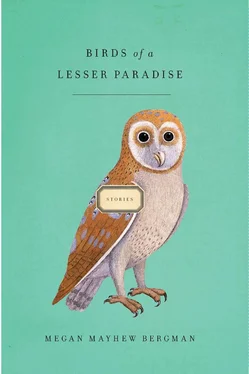Now, as a veterinary technician, I regularly assisted with necropsies at the zoo. I’d picked apart red pandas who’d died after ingesting pesticides. I’d gone elbow-deep in an old camel, pocketed a worn tooth from a geriatric albino tiger. My constitution was stronger than when I was younger. I was solution-driven, fascinated by what ailments plagued these exotic animals, always eager to pinpoint the previously undetected tumor, the birth defect, or rotted intestine.
Pigs might be better stewards of the earth when we’re gone, Malachi said, noticing the book in my hands.
I closed my eyes and laced my hands over my chest.
Can I get you to try some of this eggplant? Malachi said. You haven’t eaten much today.
I sat up with the intention of standing but felt as if I couldn’t leave the couch.
Do we have any saltines? I said. Gatorade?
No, Malachi said. But I’m happy to run out and get some for you.
Don’t come back with any organic stuff, I said. Please . I need the real thing. No weird crushed-wheat crackers.
Malachi frowned, stuffed his wallet into the pocket of his slim jeans, and disappeared, letting the soundscape of the street enter again for a brief moment until he closed the door behind him.
I felt guilty. I’d let him down by getting pregnant. As if it was something my body had done. On top of the guilt, I was panicked and unleashing it on Malachi, who, despite his firm convictions, had a sweet temperament. Or a mostly sweet temperament. He could be utterly single-minded about his cause, stonewalling my friends from college who chose to have children, or speaking harshly about his cousins and their broods of kids. He had clear views on sustainable fish and could come off as heavy-handed at dinners out, advising our friends what to order— you’ve got to cut out the farmed fish . He wasn’t shy about telling you when you used too much water washing dishes, and he collected discarded wrapping paper on holidays with a pained look on his face. I wish you wouldn’t wrap my presents, he told my family last Christmas.
I dealt with his need to advise and control because it came from a good place — his love of the world — though my mother said she found his self-righteousness appalling. I admired his principled way of living. I agreed with nearly every stance he took, but for good or bad didn’t take myself as seriously. I didn’t feel the searing conviction he felt, and sometimes when we were out at coffee shops recruiting for EWU, I realized I was there more for Malachi’s company than for the cause itself.
Malachi was often serious and prone to bouts of melancholy about the environment — but he had a sense of humor. He joked with his friends over beers at the pub down the street or brought them home to drink scotch and listen to his collection of vintage Richard Pryor albums. He liked to play his mandolin on the back porch and make up songs about people passing by:
Mustache man, mustache man, he walks to the metro as fast as he can. Come hell or high water, he’ll bring donuts to his daughter, Oh sweet-talking mustache man.
He came back from the store with the sort of products he despised — commercial bastions. But he covered my feet with a throw made by Peruvian widows, poured me a glass of hyper-red Gatorade, and massaged my temples.
Thank you, I said, aware that we were playing a game of goodwill, trying to rack up a surplus of kind deeds before the unavoidable argument came.
Later that night, he came to me and said: I called the clinic, and whenever you’re ready, they can give you a pill. if we act early enough. What do you think about tomorrow?
I didn’t respond; I wasn’t sure how to. It was another example of Malachi’s earnest principles at work, but now they were directed at me and it hurt.
I shrugged, then excused myself. I’m going to get ready for bed, I said.
The look on his face — it was as if he’d done something kind.
I sat up in bed after Malachi turned off the lights, suddenly angry at his swift response, his inability to imagine a child in his life.
I can’t go tomorrow, I said. I’m not ready to do that.
You’re considering it? he said, disbelieving. You’re considering having a baby?
Our baby, I said. And yes.
I cannot do my work with a pregnant girlfriend, he said, let alone a child. This is my credibility. You know—
You eat bacon, I said. There are holes in every principle, exceptions to the rule, ways around, contingency plans.
Not with this, he said. Not for me. If you and I feel entitled to produce another carbon-producing life, we can no longer advocate for restraint with credibility. There is a moral imperative here you’re ignoring—
Morals are man-made fabrications, I said. What isn’t natural about a baby?
You didn’t feel that way yesterday, he said. Or last year. Or five years ago.
Can’t we just explain that it’s an accident? I said. The US birthrate is down—
Human extinction is my most fundamental belief, he said, sweeping his hand across the air as if to say that arguing was worthless.
Hearing him speak was like listening to our writer friends moan about their need for solitude and time because they thought maybe, just maybe, they were doing something important for the world.
And maybe they were. But I was tired of people being so goddamn serious about their ideas.
I felt that Malachi was afraid to touch me, and I was afraid to sleep, afraid to sink one day further into a pregnancy he did not support. I watched him, first with his eyes half open, then closed as he gave in to sleep. He was a heavy sleeper. His hair was thick and dark, good Jewish hair, he called it, though he wasn’t Jewish. He wasn’t sure what he was. A classic American mutt, he said.
He’d come from a large family down South that he hardly spoke to, rural Virginia folks whom he claimed had two babies each by the time they were sixteen. I’d never met them. Malachi was a self-starter, a plucky faux orphan.
I stroked his hair; I’m not sure why I felt I should comfort him. I was the one hurting.
I’ll go away for a while, I told him, many hours later, when I wasn’t sure if it was night or early morning. I’ll go to my grandmother’s summer house in Maine.
Malachi stirred. Did you hear me? I said.
It isn’t summer anymore, Malachi said, his brown eyes opening into slits and closing again.
They haven’t shut it down for the season yet, I said. I’ll go, and I’ll think.
He put his arm around me and fell back asleep. I could hear the clock ticking, stores beginning to open up outside, the righteous clang of a delivery truck’s back door. People up early, being people, being busy, being commercial, doing what people do.
I was angry at Malachi for his harshness, for putting his ideas above me. I was tempted to let loose — to cry and itemize what we owed each other. But it would have been like entering the front lines unarmored, naked — not knowing what you wanted in an argument with Malachi was a waste of time. He always knew what he wanted — upscale Thai, an IPA, the Sunday New York Times, a bookstore without a children’s section.
The covers were distributed as they always were, sheets pulled toward Malachi’s side, the comforter stuffed between my knees. There were unspoken routines and rituals, shoes underneath the bed and books on the nightstand that reminded us what kind of people we were, should we forget for a moment, or be tempted to change.
Sadness and euphoria collided in my chest, waves of each washing over the other, until I felt only confusion and fatigue.
I wondered: What am I prepared to lose?
The next morning I packed a suitcase and made blueberry smoothies for Malachi and me.
Читать дальше












